Ever since I
converted to Catholicism
from Protestantism I’ve had people ask,
What’s the difference between Roman Catholics and
Christians?
Overlooking the question’s weird phrasing (after all, Catholics are Christians), I’ve always been happy to answer.
In short, there are many types of Christians:
- Catholics
- Orthodox (e.g. Russian, Coptic, etc.)
- Protestants (e.g. Baptists, Evangelicals, Episcopalians, etc.)
When most people ask about the difference between Christians and Catholics, they’re really asking about the difference between Catholics and Protestants.
And since Protestantism itself is so varied, I’ll be focusing on its two biggest denominations: Evangelicals and Baptists.[1]
Baptists and Evangelicals agree with about 85% of Catholic teaching, but here are 12 key differences in beliefs…
Differences Between Catholics and Protestants
- Scripture
- Tradition
- Sin
- Salvation and Justification
- The Cross
- The Afterlife
- Relationship with Jesus
- The Eucharist
- Priesthood
- Peter
- Mother Mary
- Saints
1. Scripture
Catholics and Protestants differ in their approach to the Word of God.
- Catholic Bibles have 73 books compared to Protestantism’s 66 books.
-
Protestants view Scripture through the lens of
Sola Scriptura
(by Scripture alone
in English), whereas Catholics don’t.
These two differences arose due to the teachings of the 16th-century Protestant, Martin Luther.
Martin Luther removed the books of Tobit, Judith, 1 & 2 Maccabees, the Wisdom of Solomon, Ecclesiasticus, Baruch, the Letter of Jeremiah and additions to Esther and Daniel from the Old Testament.
He also considered Hebrews, James, Jude and Revelation
disputed books
and doubted their divine
inspiration.[2]
In addition, he also popularized a new way of viewing the Bible.
Luther saw the Bible alone as containing the totality of God’s revelation to mankind while also being the sole authority to guide the Church and a Christian’s life.[3]
Luther’s personal interpretations of the Bible led him to reject many Traditions of the Catholic Church that he felt were not supported by those books of the Bible he recognised.
After his death, this view of Luther evolved to mean that all Christians can interpret and understand Scripture individually without the help of an authoritative Church.[4]
Meanwhile, the Catholic Church retained its 73-book canon and rejected the notion of Sola Scriptura.[5]
2. Tradition
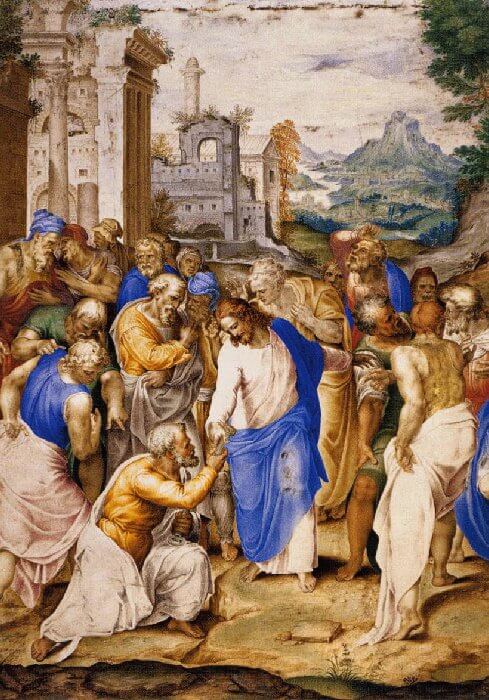
Christ Giving the Keys to St. Peterpainted by Bernardo Castello in 1598AD.
The Catholic Church believes its origin can be found in
the words of Jesus to Peter in Matthew 16:18,
you are Peter, and on this rock I will build my
church.
It also believes that Jesus promised, through His Holy
Spirit, to guide His Church into all truth
[6]
and make it the pillar of truth
.[7]
Catholics see this truth as having been communicated orally as well as written down.[8]
Hence, oral Traditions that have their source in Jesus and are definitively taught by this Holy Spirit-guided Church have equal authority to the Bible.
This same Sacred Tradition, protected by the Holy Spirit, is also believed to have helped codify the Bible and help know which books should be included in it.[9]
Merely historical or cultural traditions that don’t
have their source in Jesus are not considered as
authoritative as the Bible. (This distinction is often
shown through the capitalization tradition
vs.
Tradition
.)
Protestants, while recognising the usefulness of some historical or cultural traditions (lowercase), do not believe in Sacred Tradition (uppercase) and so tend to see the Bible as a standalone authority that exists almost in a vacuum.
3. Sin
Both Catholics and Protestants believe in original sin (the human tendency to commit evil.)
However, some Protestants see original sin as the total corruption of man whereas Catholics see it more as the weakening of man rather than a total corruption.
Protestants such as Evangelicals and Baptists do not
categorise sin into different levels, whereas Catholics
distinguish between sins that lead to death
and
sins that don’t.[10]
These are called mortal and venial sins respectively and, in the case of mortal sins, can only be forgiven by confessing to a priest. (More on that difference here.)
4. Salvation and Justification
Protestants typically see salvation as a past, one-time event when they accepted Jesus as their Lord and Saviour.
A lot of Baptists and Evangelicals don’t believe one can lose their salvation, and they believe this salvation comes through faith alone.
Catholics see salvation as a past, present and future
event that they can potentially squander and must
work out
until death.[11]
They believe a person is
justified by works and not by faith alone
.[12]
Not in the sense that they must do good works in order to
be forgiven, but that they’re saved by an active
faith that is formed by love and which is not an
unconditional “golden ticket” to heaven.
Other groups of Protestants would also agree with this view.
5. The Cross
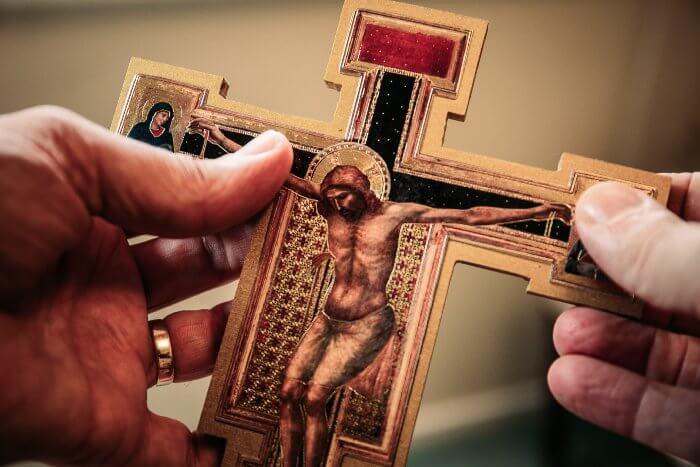
Protestants typically interpret the cross as Christ sacrificially allowing the Father to punish him as a substitute for mankind’s sin.
Catholics, taking inspiration from St. Anselm’s
writings in the 11th-century, typically
interpret the cross similarly but replace the language of
punishment
with obedience
.
In this view, the cross was Jesus’ restitution or
satisfaction
for mankind’s sin by His perfect
obedience to the Father’s will.[13]
This type of language is also expressed in Philippians
2:8:
He humbled himself and became obedient to the point of
death—even death on a cross.
6. The Afterlife
Catholics and Protestants believe in heaven and hell as two possible places people go after death.
Catholics also believe in an intermediary state called Purgatory where righteous people go temporarily to be fully purified and to finish making reparation for the temporal punishment due to sins.[14]
7. Relationship with Jesus
Protestants such as Baptists and Evangelicals emphasise a personal relationship with Jesus that is communicated entirely heart-to-heart.
They also sometimes see the external rules and rituals of Catholicism as stifling that heart-to-heart relationship.
Catholics also believe in a heart-to-heart, personal relationship with Jesus, though one that blossoms and is kept safe by the help of Christ’s Church and sacraments.[15]
8. The Eucharist
Catholics believe the bread and wine, under the action of the priest, substantially become Jesus’ body and blood.[16]
For this reason, Catholics consider the Eucharist the centre of the Christian life and offering it the highest form of worship to God.[17]
Most Protestants such as Evangelicals and Baptists believe that the bread and wine in Holy Communion are only symbolic of Jesus’ body and blood.
Because of this symbolic view, their highest form of
worship is praise music or the preaching of the Bible, and
they see the Eucharist (i.e.
the Lord’s Supper
) as simply a way to
remember Jesus’ sacrifice.
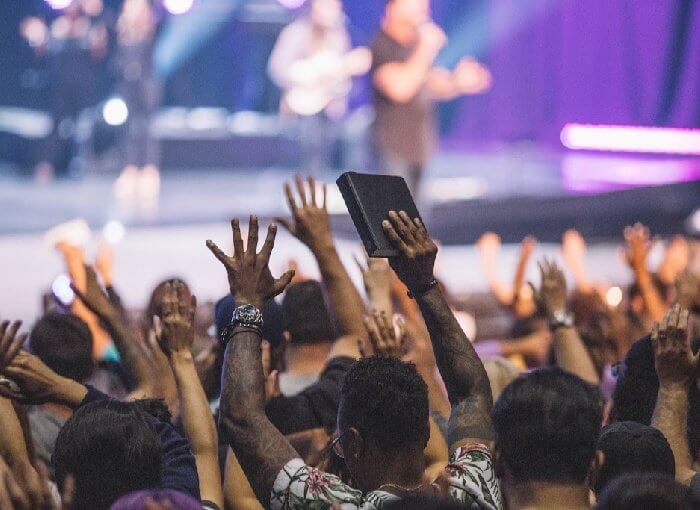
9. Priesthood
Baptists and Evangelicals don’t believe in a specific New Testament priesthood but think that all believers are priests in a general sense.
While Catholics agree with this general sense, they also believe in a specific priesthood that started with the Twelve Apostles and was passed down through the centuries.[18]
This is called the doctrine of Apostolic succession, which some Protestants such as Baptists and Evangelicals reject.
10. Peter
Catholics believe Peter was the chief Apostle who was given special authority by Jesus.[19]
At the time of his death in Rome, it’s believed Peter passed on his authority to a successor, who then at death passed it on again to another successor, and so on.[20]
And so for Catholics, the current Pope is a direct successor to Peter and shares his authority.
While Protestants such as Baptists and Evangelicals more-or-less agree that Peter was the chief Apostle, they don’t typically believe in Apostolic succession.
Hence, they do not believe Peter has a living successor.
11. Mother Mary

Protestants (especially Baptists and Evangelicals) usually see Mary simply as a devout woman chosen to be the mother of Jesus.
Whereas Catholics believe that Scripture and Tradition also teach she was a perpetual virgin, immaculately conceived, assumed into heaven, and coronated the Queen of Heaven too.[21]
12. Saints
Some Protestants such as Evangelicals like to call all
baptised Christians saints
.
Catholics recognise the validity and biblical-origin of this language though aren’t prone to use it since it has become a title in the Catholic Church.
Saint
(with the uppercase S
), is a title
normally only ascribed to canonized saints that the Church
have investigated and found worthy of imitation.
Moreover, Protestants don’t usually ask deceased saints to pray for them as Catholics do, with some even considering it idolatrous.
Catholics see no difference between the Church on Earth and the Church in Heaven and so ask saints to pray for them in the same way they may ask a friend on Earth to pray for them.[22]
Please note that this was a basic introduction to these real (and sometimes contentious) differences between Catholic Christians and Protestant Christians.
So, what do you think? Feel free to express your thoughts in the comment section!
Footnotes:
1. Pew Research Center’s 2015 demographic study, America’s Changing Religious Landscape ˄
2.
Up to this point we have had to do with the true and
certain chief books of the New Testament. The four
which follow [i.e. Hebrews, James, Jude and
Revelation] have from ancient times had a different
reputation.
— Martin Luther’s preface to Hebrews.
˄
3.
A simple layman armed with Scripture is to be
believed above a pope or a council without it…neither
the Church nor the pope can establish articles of
faith. These must come from Scripture.
— Roland H. Bainton’s book Here I Stand
,
page 117.
˄
4.
…most Protestants have adopted a subjective and
individualistic version of sola scriptura that bears
little resemblance to the doctrine of the
Reformers.
— Keith A. Mathisons’s introduction to
The Shape of Sola Scriptura
,
pages 13-14.
˄
5.
Decree Concerning the Canonical Scriptures
from the 4th session of the Council of
Trent.
˄
6. John 16:13 ˄
7. 1 Timothy 3:15 ˄
8.
2 Thessalonians 2:15
and the
Decree Concerning the Canonical Scriptures
from the 4th session of the Council of Trent:
…seeing clearly that this truth and discipline are
contained in the written books, and the unwritten
traditions.
˄
9.
It is clear, therefore, that sacred tradition, Sacred
Scripture and the teaching authority of the Church, in
accord with God’s most wise design, are so
linked and joined together that one cannot stand
without the others.
—
Dei verbum, chapter 2, point 10.
˄
10. 1 John 5:16 ˄
11. Philippians 2:12 ˄
12. James 2:24 ˄
13.
Anselm did not teach penal substitution. Yes, he
brought to prominence the vocabulary of
‘satisfaction’, which became important in later
formulations. But in Anselm’s feudal thought-world, it
was God’s honour that needed to be satisfied by
substitutionary obedience, not his justice by
substitutionary penalty.
— Response to N.T. Wright’s criticism of
Pierced for Our Transgressions
from the
authors.
˄
14. 2 Maccabees 12:39-46, Matthew 5:25-26, 1 Corinthians 3:11-15. ˄
15.
The seven sacraments touch all the stages and all the
important moments of Christian life: they give birth
and increase, healing and mission to the
Christian’s life of faith.
— Catechism of the Catholic Church,
paragraph 1210.
˄
16.
John 6:32–71,
1 Corinthians 10:16–17,
11:23–29, St. Ignatius of Antioch’s
Letter to the Romans
(7:3),
Letter to the Smyrnaeans
(chapter 7).
˄
17. Catechism of the Catholic Church, paragraph 1324. ˄
18. Lumen gentium (chapter 2). ˄
19. Matthew 16:18-19, John 21:15-17, and more found here. ˄
20. Eusebius of Caesarea’s
Church History
(3:4:9–10,
5:28:3), St. Ireneaus of Lyon’s
Against Heresies
(3:3:3), St. Epiphanius of Salamis’s
Medicine Chest Against All Heresies
(Section II), etc.
˄
21. See here for biblical support. ˄
22. Revelation 5:8, Matthew 17:3, Mark 12:27, and see here for more. ˄


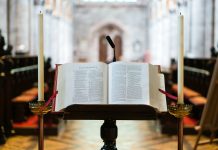


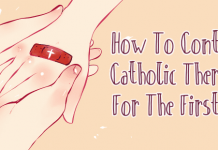


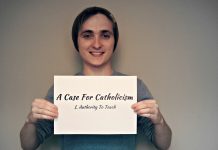
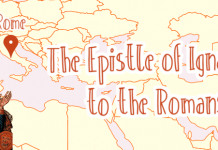
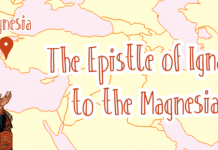
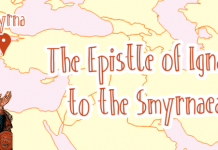
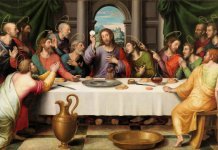
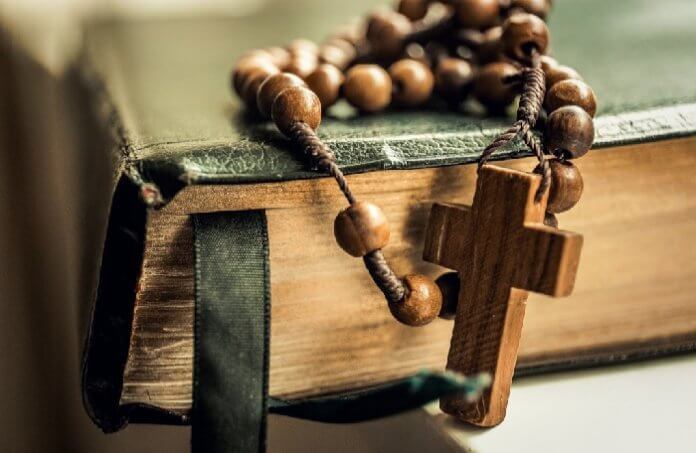




You wrote Christians as a heading and then you started speaking about Protestants. Is this how Catholics mislead their people?
Hi Romano. The reason why the article switches from “Christian” to “Protestant” is that both Protestants and Catholics are Christians. So I had to clarify that and get more specific so I could meaningfully describe the differences in beliefs between the two. Moreover, most who reject the “Protestant” label and exclusively label themselves as “Christian” nonetheless have Protestant roots and beliefs.
Thank you for such a succinct explanation!
I appreciate you taking time to try and explain the differences. But you are all but true when stating: Baptist believe they could never loose their salvation. This is so inaccurate.
So basically you’re saying that Baptist believe once saved always saved. And they never have to worry about any further sins they may commit afterwards because they have already been saved? (Untrue)
Hi Keezie, thanks for your comment that highlights the fact that not all Baptists believe one can lose their salvation—you are right. However, eternal security is a belief commonly found among other Baptists.
“…All true believers endure to the end. Those whom God has accepted in Christ, and sanctified by His Spirit, will never fall away from the state of grace, but shall persevere to the end. Believers may fall into sin through neglect and temptation, whereby they grieve the Spirit, impair their graces and comforts, and bring reproach on the cause of Christ and temporal judgments on themselves; yet they shall be kept by the power of God through faith unto salvation.” — Section 5, The Baptist Faith and Message, Southern Baptist Convention, 2000.
I enjoyed your article and would love to use this as a source but I don’t see the date when it was published.
Hi Sunny, thanks for your comment. The article was originally published 2018-06-12 and was last updated 2020-08-28